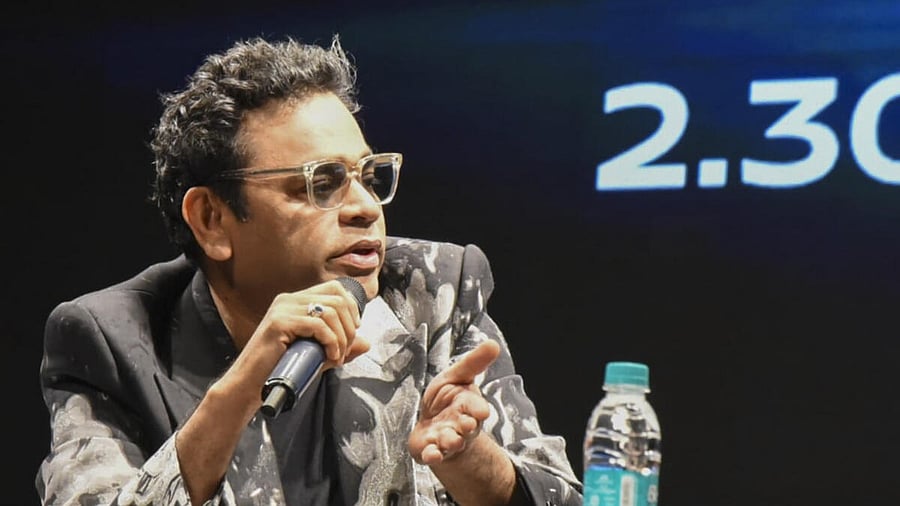
Oscar-winning music director A R Rahman
Credit: PTI Photo
Panaji: Oscar-winning music director A R Rahman recalled an incident with Lata Mangeshkar at the 55th International Film Festival of India. He was at Kala Academy to talk about ‘Musical Theatre in India’ as a part of this year’s Lata Mangeshkar Memorial Talk.
“While doing stage performances, I never practiced. Once Lataji invited us to perform in Hyderabad. I finished rehearsal and went to take a nap. I was surprised to hear her practice from her room. She was practicing all the songs for an hour and a half. That’s when I changed and started practising before a show,” he said.
Headhunting to Beatboxing, a documentary film produced by Rahman, premiered at the festival on Tuesday. The documentary tells the story of a tribe in Nagaland that was engulfed in the depths of violence and bloodshed and has now resurrected itself through music.
“They had a violent past, and I always like transformation,” said A R Rahman about why he chose to produce the documentary. He was invited as a guest at the Hornbill Music Festival, he saw a transformation that was “unique and inspiring”.
“When a society goes into peace and finds their reason to change their lifestyle and progress, it is very inspiring. I found some of the best song writers and voices in Nagaland.”
Talking about what forced him to start the KM Music Conservatory and the Sunshine Orchestra, Rahman said Andrew Lloyd Webber had suggested he take on the mantle of musical theatre. “I didn’t understand him then and wondered what this man was saying. But over the years it worked like medicine in my mind. In the past five decades, India has progressed in movies, but we’re far behind on the other side of arts like musical theatres or symphonies. There is so much of a void in entertainment despite the cultural richness of the country,” he said.
He believes, apart from cinema, people should also be able to experience music and storytelling, watching it with thousands of other people together in a theatre.
Talking about how various musical theatres in India can come together, he said, “In the world of AI, where things can be created with a prompt, people will love musical theatre even more. Because there is a sense of participation. Families will come together because their sons and daughters will be a part of it. There will be a reason for everyone to come together and watch it. That is my dream.”
“We go to the west to watch Broadway plays. Japan and China as well are celebrating their culture in a whole new way. What do they come to India for? What’s unique here in terms of music and theatre,” he questioned.
What is so unique about our country is the culture, the sound of our languages, and the food—that should be celebrated. It has to be presented in such a way that people on the outside will feel, ‘Wow, we cannot replicate it.' We don’t want to do ‘Romeo and Juliet’. We can do our own things that cannot be replicated outside,” Rahman added.
In an earlier session, Sharmila Tagore recalled memories with Tapan Sinha at the ‘Tapan Sinha: The Spectrum and the Soul’ panel discussion. Actors Sharmila Tagore and Arjun Chakraborthy and film critic and scholar N Manu Chakravarthy were the panelists, moderated by journalist Ratnottama Sengupta.
“My first meeting with Tapan babu was when I was 11 years old. He was making ‘Kabuliwala’ (1957) and my sister Tinku (credited as Oindrila Tagore) played Mini. That’s when I had the opportunity to see him and I called him Tapan kaku,” Sharmila recalled.
The weeklong festival, which began on November 20, will conclude on Thursday.